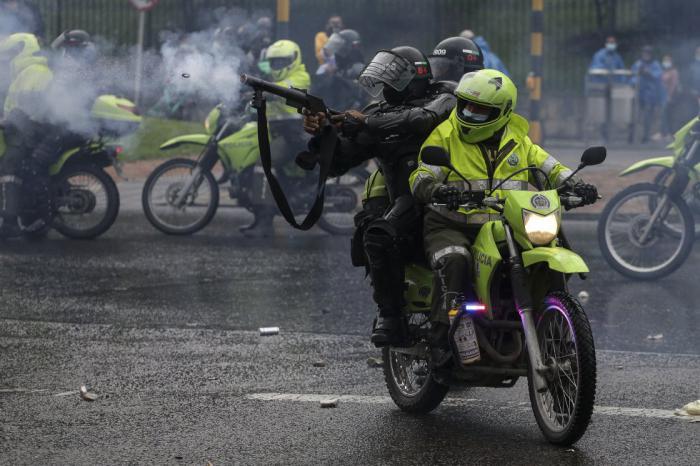
Since April 28, Colombia has been living days of extreme tension. Images of terror and desperation fill the media and social networks.
One of the scenes that most shocked international public opinion was that of a helicopter hovering some 15 meters above the ground and shooting at demonstrators in the city of Buga, in the department of Valle del Cauca.
Also striking is the death toll, over 40, according to the Institute for Development and Peace Studies (Indepaz), most at the hands of the National Police Mobile Anti-Riot Squad (Esmad). The Indepaz report also states that suspected homicides of two more men and a woman remain under investigation, while its sources indicate that 1,200 have been injured, at least 87 gone missing and 18 eye injuries suffered as a result of police violence.
Added to this situation is concern about the possible declaration of a state of internal disorder, which can be decreed by the President, as established in Article 213 of the Constitution, when public order in the country is considered out of control. If approved, it would allow President Iván Duque to suspend regional governors, restrict public demonstrations, assume control of radio and television for a maximum period of 90 days, in addition to allowing security forces to conduct home inspections without the obligation to acquire a prior court order.
"A dark week with Uribe incarnated in Duque," is how El Espectador defined these disturbing days, referring to the former President.
Demonstrations are taking place in almost every city in the country. In Cali, a wake was held to honor those killed during the strike. In Medellín, reports cite the deployment of security forces with an anti-riot tank and street lighting switched off.
Also in Pasto, in the department of Nariño, Esmad dispersed demonstrators with tear gas and stun bombs. In the case of Cartagena, demonstrations took place without public disturbance.
In Barranquilla, a tense confrontation occurred between demonstrators and the Esmad. Broadcast live on social media were images of a young man convulsing after being hit by an anti-riot tank’s water cannon.
Why do the protests continue?
The two main demands that sent Colombians into the streets have been met: the tax reform was repealed and the Minister of Finance, Alberto Carrasquilla, resigned. Protesters insist, however, that "the strike continues" to achieve a more just society.
The National Strike Committee's demands include a more egalitarian economy, a change in the nation's unequal, exclusionary economic model, and the adoption of other measures to address inequality, poverty and clientelism.
Demonstrators also demand police reform, including the dismantling of the infamous Mobile Anti-Riot Squad, responsible for the violent repression of protesters.
Calls are also being made for full implementation of the Peace Agreement signed in 2016 between the government of Juan Manuel Santos and the FARC-EP.
The population won by coming out massively to demonstrate their rejection of the Duque government’s policies, but many problems remain, aggravated by a neoliberal model which has left 7.6 million Colombians in extreme poverty, according to the Latin American Strategic Center for Geopolitics, a situation that has worsened during the COVID-19 health emergency.
All this is taking place in a pre-election year, as political formations are beginning to think and act with a view toward attracting voters and protecting their own interests.
What does the world have to say?
The UN High Commissioner for Human Rights, Michelle Bachelet, expressed her concern given the violations of human rights in cities like Cali. "We express our solidarity with those who have lost their lives, or have been injured, and with their families," she stated.
Meanwhile, the Bolivarian Alliance for the Peoples of Our America-People's Trade Agreement (ALBA-TCP) condemned the excessive use of force and repressive climate reigning in Colombia following the protests, which “have resulted in physical violence, arbitrary detentions, complaints of disappearances, sexual abuse and some 31 people dead and more than a thousand injured.”
The Alliance called on authorities to "protect human rights, the right to life and personal safety," noting that the government’s use of violence does not resolve the structural causes of social injustice.
Likewise, the European Union (EU) condemned the violence and the "disproportionate" use of force against protesters, and insisted on the imperative to contain escalation of the situation, as stated by European External Action Service spokesman, Peter Stano, who conveyed the bloc’s confidence that Colombian institutions would "investigate and incarcerate those responsible for any abuse and violation of human rights."
The Cuban United Nations Association, an entity that includes more than a hundred civil society organizations on the island, along with the Cuban Institute of Friendship with the Peoples, joined the many voices of solidarity raised around the world.
For its part, the United States government urged Colombian forces of law and order to exercise "maximum restraint" to avoid more deaths, reported the AFP news agency, quoting a press conference statement by Jalina Porter, principal deputy State Department spokesperson.
The Washington Office on Latin America (WOLA), a non-governmental organization in the United States, also condemned the use of force by the Colombian Mobile Anti-Riot Squad and other police units, as well as hostile statements by high-ranking officials and influential politicians, including former President Alvaro Uribe who is constantly calling for violent repression.
The Colombian social organization, Congreso del Pueblo, reported on its Twitter account that more than 130 political groups and social movements in Our America have called for "energetic solidarity with the Colombian people, who are resisting and heroically confronting brutal police repression".
The non-governmental organization Save the Children also expressed its concern and indignation regarding the violent attacks that have occurred, in which boys and girls, adolescents and their families have been seen hurt.
Likewise, 10,000 Colombian professors have demanded that the Armed Forces and National Police immediately stop their violence and that those responsible for crimes committed against the civilian population be investigated and brought to justice.








